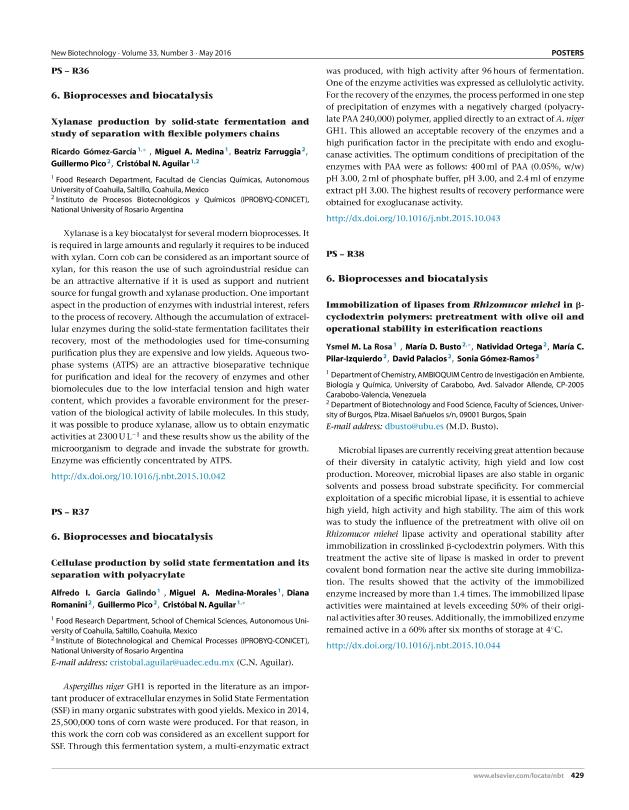Artículo
Xylanase production by solid-state fermentation and study of separation with flexible polymers chains
Gómez García, Ricardo; Medina, Miguel A.; Farruggia, Beatriz Monica ; Picó, Guillermo Alfredo
; Picó, Guillermo Alfredo ; Aguilar, Cristobal N.
; Aguilar, Cristobal N.
 ; Picó, Guillermo Alfredo
; Picó, Guillermo Alfredo ; Aguilar, Cristobal N.
; Aguilar, Cristobal N.
Fecha de publicación:
05/2016
Editorial:
Elsevier Science
Revista:
New Biotechnology
ISSN:
1871-6784
Idioma:
Inglés
Tipo de recurso:
Artículo publicado
Clasificación temática:
Resumen
Xylanase is a key biocatalyst for several modern bioprocesses. It is required in large amounts and regularly it requires to be induced with xylan. Corn cob can be considered as an important source of xylan, for this reason the use of such agroindustrial residue can be an attractive alternative if it is used as support and nutrient source for fungal growth and xylanase production. One important aspect in the production of enzymes with industrial interest, refers to the process of recovery. Although the accumulation of extracellular enzymes during the solid-state fermentation facilitates their recovery, most of the methodologies used for time-consuming purification plus they are expensive and low yields. Aqueous two-phase systems (ATPS) are an attractive bioseparative technique for purification and ideal for the recovery of enzymes and other biomolecules due to the low interfacial tension and high water content, which provides a favorable environment for the preservation of the biological activity of labile molecules. In this study, it was possible to produce xylanase, allow us to obtain enzymatic activities at 2300 U L−1 and these results show us the ability of the microorganism to degrade and invade the substrate for growth. Enzyme was efficiently concentrated by ATPS
Palabras clave:
Xylanasa
,
Fermentacion
,
Enzymas
Archivos asociados
Licencia
Identificadores
Colecciones
Articulos(IPROBYQ)
Articulos de INST. DE PROCESOS BIOTECNOLOGICOS Y QUIMICOS ROSARIO
Articulos de INST. DE PROCESOS BIOTECNOLOGICOS Y QUIMICOS ROSARIO
Citación
Gómez García, Ricardo; Medina, Miguel A.; Farruggia, Beatriz Monica; Picó, Guillermo Alfredo; Aguilar, Cristobal N.; Xylanase production by solid-state fermentation and study of separation with flexible polymers chains; Elsevier Science; New Biotechnology; 33; 3; 5-2016
Compartir
Altmétricas



